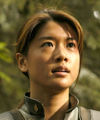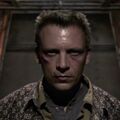Cylon Models
| Part of the series on |
Centurion Model 0005
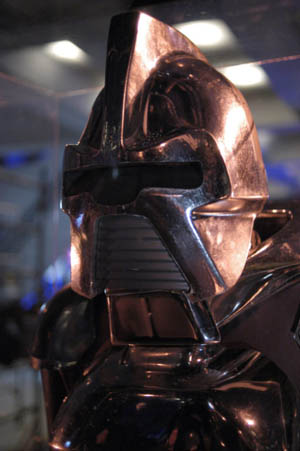
Model Name: Cylon Centurion
- Main article: Cylon Centurion Model 0005
The Centurion Model 0005, glimpsed briefly in two scenes of the Miniseries, was apparently the latest Cylon model to have been extensively documented by Colonial authorities after the Cylon War. It is a primitive model, resembling a short, clumsy humanoid with a single red eye - or as some of the Colonials contemptuously referred to them, "chrome toasters". According to Saul Tigh in a deleted scene from the episode "Resistance", they had a distinctive "stink" of machine oil.
These models were apparently the instigators of the Cylon Rebellion, or their immediate descendants. They fought in all the major engagements of the Cylon War, including the boardings of Brenik and Galactica. A painting by Monclair depicts a massive melee between early-model Cylons and joint Aerelon-Caprican ground forces.
They were apparently far from emotionless — in the above-mentioned scene, Tigh recollects their vicious tactics in hand-to-hand combat: "The first one was Duncan Raverty. I found him in the corridor. His guts were strewn around on the floor. Y'know, at first I couldn't figure out why the Cylons would bother doing something like that [...] You had to look into their red eye-slit. They hated us. They hated us so much it wasn't enough just to kill us."
- This model was included in the miniseries primarily as an homage to the Original Series. Within the context of the Re-imagined Series, the Model 0005 is over 40 years old, and was the last assumed appearance of the Cylons after the war. While remarks by Number Six in the miniseries state that "those [walking chrome toaster] models are still around. They have their uses," it is most likely that she is referring to the modern Centurions, which seem to have replaced them entirely.
Modern Centurion
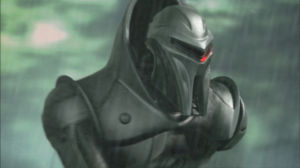
- Main article: Cylon Centurion
The current mainstay of Cylon ground forces, the modern Centurion is a taller, swifter and more agile unit than the Model 0005. Its "fingers" serve as edged weapons in close-quarters combat, and can retract to make way for projectile weapons built into its forearms.
There are apparently two armor configurations - the Centurions encountered by Lt. Karl Agathon on occupied Caprica were susceptible to normal small-arms fire, while the boarding party dispatched to Galactica in the episode "Valley of Darkness" could only be impeded by explosive rounds.
While the earlier Centurion models presumably took a leadership role in their war against the Colonials, modern Centurions appear completely mute and subservient to the human models. RDM said in a blog entry on January 20th, 2006, that "the Centurions are not sentient[,] and their memories/experiences are not downloaded into new bodies when they die."
Cylon Spacecraft
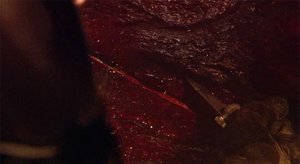
- Main article: Cylon Spacecraft
The current model Cylon Raider is an unpiloted, autonomous craft (Miniseries), apparently capable of operating at fair distance from any command vessel (Tigh Me Up, Tigh Me Down; Final Cut). Capt. Jackson Spencer, encountering the newer model Cylon Raider for the first time, expresses shock that "nobody's flying these things". Lt. Kara Thrace later discovers that the Raider she had shot down over the Red Moon was, after a fashion, "alive". She removes most of its organic parts before returning with it to Galactica. There, Sharon Valerii, a Cylon sleeper agent, guesses that the Raider is a Cylon in its own right, although "More of an animal, maybe, than the human models... like a pet" (Six Degrees of Separation).
Later on, in the the episode Scar, Sharon Valerii and Kara Thrace have a discussion about the Raider that has been shooting down pilots frequently, and Sharon confirms that Raiders 'download'/reincarnate. In addition, Sharon reinforces the earlier statement about the animal-like nature of Raiders, saying, "A raider's much like a trained animal, with the basic consciousness and survival instinct."
The basestar also makes extensive use of organic parts (Kobol's Last Gleaming, Part II). The ship is commanded by a group of Cylon agents, but has a living humanoid computer, known as a Hybrid, that manages ship functions and takes orders from other agents. It is unclear whether or not a Hybrid can function autonomously.
- In both these cases, the distinction between a "Cylon" and their own semi-sentient technology becomes increasingly blurred — interestingly, the same problem that led to the Cylon War in the first place.
Human Models
- Main article: Cylon agent
At some point at least two years prior to the miniseries, Cylon forces in exile on their homeworld were able to perfect the creation of organic models, almost completely indistinguishable from human beings. These were used to quietly and effectively infiltrate the Colonial defense forces, with agent models such as Number Six gaining access to secret military technology, and sleeper agents such as Sharon "Boomer" Valerii being planted within the Colonial Fleet itself.
Cylon agents can be programmed to believe they are human, and several have been planted within Colonial society with false memories and forged backgrounds. Unplanned discovery of their true nature can be extremely disturbing for these units, and their behavior is not always predictable.
Cylon agents are visually indistinguishable from humans. Only slight chemical differences reveal human from Cylon agent. Humanoid Cylons apparently differ from humans in three principal ways:
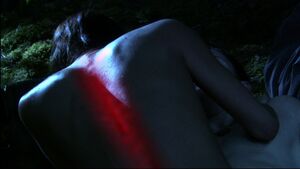
Reproductive Difficulties
With a single exception, no human-model Cylon has been able to conceive a child (The Farm). It is impossible for two Cylons to reproduce with each other, and as result the Cylons began cross-breeding experiments with humans (who can reproduce easily), which so far has only resulted in the pregnancy of the Caprica-copy of Sharon Valerii. Cylon beliefs attribute this to the apparent inability of Cylons to feel love, which they believe to be a crucial element of the process.
Bio-luminescence
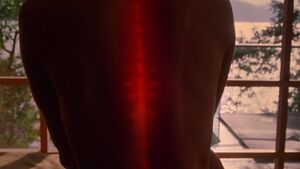
On two occasions, the vertebrae of human-model Cylons have been seen to emit a red glow visible through the skin during sexual intercourse (Miniseries, "Six Degrees of Separation").[1]
Other elements of Cylon humanoid physiology are light-sensitive. Tissues disguised in their forearms behave as a data link that can be interfaced, after a fashion, to Colonial fiber-optic networks (Flight of the Phoenix), but is primarily used in accessing the Cylon optical network known as the datastream ("Torn," "A Measure of Salvation").
Silica Pathways
Cylon brains are imbued with a vaguely described technology called silica pathways. This legacy technology existed in the original Centurion Model 0005, but some of this technology remains in the human models, although the technology appears to have been integrated at the molecular level since the brains of Cylon agents and humans are visually identical. Silica pathways are possibly key in the maintenance or transfer of thoughts, memories and consciousness of a Cylon to be downloaded and transferred into a new body when the agent dies. Silica pathways in Cylon agents, as in Centurions, remain susceptible to certain forms of radiation, as found in the storm surrounding Ragnar Station and the Plutonium used as the active element of Dr. Gaius Baltar's Cylon Detector. It normally takes several hours of prolonged exposure for this radiation to have a visible effect (Miniseries, "Bastille Day").
Known Models
In the miniseries, somewhat ambiguous comments by Caprica-Six and a note left for William Adama (presumably by Gaius Baltar) indicated that there were only twelve humanoid models at the time of the Fall of the Twelve Colonies. These were clarified by Ronald D. Moore in an interview on "The Chase Show", hosted on the SF webcast news site [1]. Of the twelve human models, seven have been revealed as of the episode "Lay Down Your Burdens, Part II."
The "final five"
The existence or knowledge of the five remaining models appear to be something of a taboo in Cylon society. When Baltar mentions their absence to Caprica-Six he is told not to talk about them. The identities of these five models appear to be suppressed or missing from the Cylon's collective knowledgebase.
In the episode "Hero," five silhouette figures are seen by Number Three in the Opera House (previously seen by Gaius Baltar in Kobol's Last Gleaming, Part II and Scattered) while she was in the "space between life and death" prior to resurrection.
D'Anna-Three and Baltar are attempting to answer the mystery of the five by visiting the Temple of Five (The Eye of Jupiter).
Organizational Relationships
The exact nature of the Cylon hierarchy remains unclear. The humanoid models, as the most evolved form of Cylon, are definitely in charge of the Centurions and Raiders. Caprica-Six's statement in "Downloaded" that Cylon culture is based on unity and that celebrities such as herself are something new implies that there is no single "Imperious Leader" as there was in the Original Series. Instead, each model appears to be equal in terms of power and authority and the Cylons appear to make critical decisions based on consensus, or failing that, majority opinion. One or two representatives from each available model gather and discuss matters in a forum-like environment then hold a vote on what course of action to take. Each model gets one vote that appears to represent the opinion of every copy of that model (except in one known instance where Caprica-Six disagreed with the other Number Sixes). The Centurions, Raiders and the Baseship Hybrids are not permitted a vote in the decision making process (Occupation through A Measure of Salvation).
- ↑ This effect was discontinued by the series writers and is now considered a continuity error.


